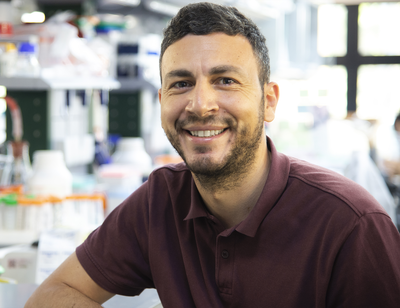Assistant Investigator
Other positions:
Assistant Professor, Medical Genetics Unit, Department of Medical and Translational Science, Federico II University of Naples, Italy
Gennaro Napolitano obtained his master’s degree in Biological Sciences in 2005 at the University of Naples “Federico II”, where he also obtained his Ph.D. in 2009, after completing his training at the Institute of Genetics and Biophysics in Naples. Then he moved to the United States to work as a post-doctoral fellow at the University of California, San Diego and at The Scripps Research Institute, La Jolla. In 2014, he moved back to Italy to join the Telethon Institute of Genetics and Medicine (TIGEM). During his post-doctoral training he was awarded with several fellowships from different sponsors, including the Horizon 2020 European Union - Marie Skłodowska-Curie, DTI-IMPORT/Marie Skłodowska-Curie COFUND, CRF, AICF and AIRC. In 2016, he was appointed as a Research Fellow at the University of Naples “Federico II”, where he also became Assistant Professor in 2019. In 2020, he became group leader at TIGEM as an Assistant Investigator.
Gennaro Napolitano's research has mainly focused on cellular signaling pathways in human genetic disorders. He has authored numerous publications in high-impact peer reviewed scientific journals. His research is currently funded by Telethon, AIRC and the Italian Ministry of University and Research.
The main focus of our lab is to understand how the aberrant activation of metabolic signaling pathways underlies the pathogenesis of human genetic diseases. We are particularly interested in the study of the lysosome, a key organelle with nutrient sensing and signaling functions. Mutations in genes crucial for lysosomal activity lead to a class of diseases, defined lysosomal storage disorders (LSDs), which are characterized by alterations in metabolite availability and signaling. Moreover, deregulation of lysosomal activity and metabolic signaling is often observed in cancer cells, serving as an adaptation mechanism that allows cell survival and growth in the crowded tumor microenvironment. We employ cell biology, proteomic, metabolomic and gene editing approaches to understand how cells sense and signal fluctuations in nutrient availability and how deregulation of these processes is involved in disease pathogenesis. Our ultimate goal is to leverage these findings for the discovery of novel therapeutic targets in inherited metabolic diseases and cancer.
- A substrate-specific mTORC1 pathway underlies Birt-Hogg-Dubé syndrome. Nature, 2020
- mTOR-dependent phosphorylation controls TFEB nuclear export. Nature communications, 2018
- TFEB at a glance. Journal of Cell Science, 2016
- Impairment of chaperone-mediated autophagy leads to selective lysosomal degradation defects in the lysosomal storage disease cystinosis. EMBO Molecular Medicine, 2015
- Upregulation of the Rab27a-dependent trafficking and secretory mechanisms improves lysosomal transport, alleviates endoplasmic reticulum stress, and reduces lysosome overload in cystinosis. Molecular Cell Biology, 2013
Complete List of Published Work in MyBibliography
Quote
I study the basic signaling mechanisms controlling nutrient sensing and how dysfunction of these processes underlies disease conditions. Our ultimate goal is to leverage these findings for the discovery of novel therapeutic targets in inherited metabolic diseases and cancer.
Additional Funding
- WCF - Targeting metabolic vulnerabilities in pancreatic cancer (2023-2027)
- Non-canonical mTOR signaling in B-cell lymphoma (2020-2024), AIRC – MFAG 2019
- Interplay Between the heat shock response and the CLEAR network (2021-2022), Orphazyme






